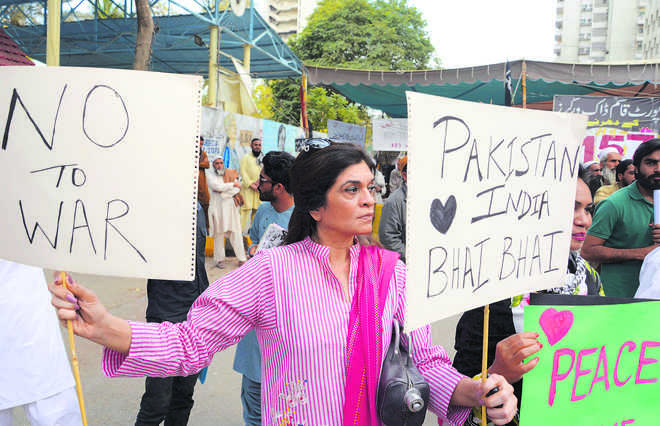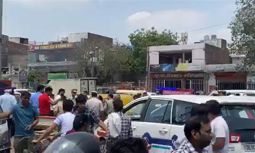
OPPORTUNITY: Narendra Modi and Imran Khan must transform their politics into statesmanship.
Shiv Visvanathan
Academic associated with Compost Heap
THE aftermath of the Pulwama attack is evolving like an action-packed serial, each day bringing a different train of events. The narrative can move towards peace or war. As one watches Prime Ministers Narendra Modi and Imran Khan, one senses a difference in the body language and scripts. After the Balakot air strike, Imran seems to have thawed out, desperately wanting India to come to the negotiation table. The release of the IAF pilot, Wg Cdr Abhinandan Varthaman, has to be seen with generosity.
Yet, Imran has to be read twice — a man who thinks of peace on the one hand and launches F-16 jets across the border on the other. If Modi is caught between machismo and democracy, Imran is caught between militarism and fundamentalist Islam. It is almost as if the attitudes to peace and war capture the schizophrenic levels of each society. The Jekyll and Hyde in each society must confront its own double before it confronts the other across the border. At one level, Modi can claim that it is Pakistan’s attitude to terrorism that creates the current impasse.
However, Modi stands unmoved, content with the air strike. A Prime Minister needs to be more open. One senses that his silence is not even tactical. If his silence evokes an indifference to the cause of peace, it is even more worrying. Modi and his Cabinet sound like a group content with the Balakot bombing, which they dub a preemptive strike. They behave as if the bombing, as a communicative act, has said enough.
Like Imran, Modi must realise that though he is battling the enemy beyond the border, he is also contending with the demonology within. He has to realise that Muslim minorities have become the enemy within. One needs a desperate exorcism of this demonology. Modi talking to Imran then becomes a hope against the terror within. Each country exorcises itself to face the enemy without. Peace almost becomes a choreography of the unconscious as each nation searches for a self it can live with and which is liveable to the other.
There is a danger that Modi’s studied silence may be misread. One needs speech even to clarify one's action to oneself. Words like clinical strike, surgical strike and preemptive strike are comic-book science. Modi needs to talk, listen and communicate. One is not denying the tactical power of the bombing, but peace needs warmth and concern. The last thing we need is this alleged machismo of indifferent silence. It looks like a good strategy, but appears more and more like bad wisdom. One knows he said the possibility for negotiations is over. He should realise now that communication should be open for the possibility of peace to survive. Both Modi and Imran must transform their politics into statesmanship. Peace is always an overreaching of the self as it struggles with the other.
One has to examine what India needs to exorcise within itself to be ready to wage peace. In this context, a photograph of the Cabinet meeting on the crisis intrigued one, but not for the conventional reasons. Among the gaggle of predictable men, from Rajnath Singh to Piyush Goyal, are two women — Nirmala Sitharaman and Sushma Swaraj. Two seasoned politicians with competent records and a powerful presence, mature and responsible, yet what one wished to ask is were they mere professionals, party members or did they respond as women to the question of war. I do not think this is a facetious or light-hearted question because there is a sense of tragedy, an almost Greek tragedy haunting these two countries.
When I first heard about the air strike, the story of three women came to my mind. A friend of mine said her mother froze into sadness. The very logic of war demanded meaningless deaths. The second asked me: “Is peace so impossible for you men?” The third, a student, said, “Any death like this is demeaning. Why can’t India and Pakistan talk peace?” The women in the two countries must be tired of war. One wonders whether such thoughts entered the minds of Sitharaman or Swaraj. One was reminded of the Greek play, Lysistrata, in which the protagonist plans to end the Peloponnesian War by mobilising all women to force men to sign a treaty. The power of women as an anti-war constituency dreaming the dreams of peace needs to the understood. A great woman activist once told me, tweaking the UNESCO declaration, “If war began in the minds of men, then the defences of peace must be constructed in the minds of women.” It is women and children who suffer. In private conversations, they articulate the need for a Lysistrata-like inventiveness and courage. I want to contrast the power of such a concern and message with the banality of a response.
BJP leader BS Yeddyurappa recently claimed that the air strike would easily guarantee 22 votes for the party in Karnataka. The obscenity of this claim is stark. It commodifies the elections and instrumentalises death as if death is an investment in electoral politics. One problem that has haunted the BJP is the way its leaders still act as if they are overthrowing the Mughal rule.
This reaction brings me to a populism that I find depressing. Whenever war starts and India makes a strike, we celebrate with sweets. I would like to salute our soldiers who often show more restraint and responsibility than many of our civilian experts who abstractly ‘bomb’ cities with an elan that is almost genocidal. Celebrating war as a part of the machismo of our time is no longer acceptable. Modi as a leader has to respond to these spiraling domains of violence. Assuring the country that their security is in safe hands is not enough.
A battle of demonology hardly creates peace. As a concept, security has been bloodied over time. Security seems a masculine, technocratic term. It says little about safety, less about peace. It speaks the power of violence containing violence, a balance of power as a balance of militarism versus terror. One needs to think of peace as a paradigm beyond security, which often becomes elliptical to peace. Modi has to grasp this as he responds to Imran. India has to understand both the manipulative Imran and the desperate Imran. It has to see Imran as a transition to a democracy yet to come into being. It has to address a Pakistan where a new civil society has to respond. Indian democracy must have the courage and imagination to respond, and respond with confidence and trust. An invitation to speech, to conversation begins an initiation to civility and friendship. There must be some sense of that echo in Pakistan. It is time the first notes of the symphony of peace are played out. The notes might be tentative, but these will be universally welcome.
Peace is a hypothesis we have to reinvent again and again. India, with its Gandhian roots, must be proactive, often as a nation of Muslims, an Islamic imagination of peace that neither Pakistan or Saudi Arabia can dream of. It is time for India to show the power of its Islamic thought, while it reworks the Gandhian imagination to confront the nuclear age.



























